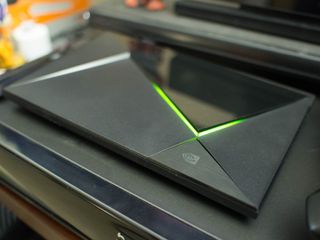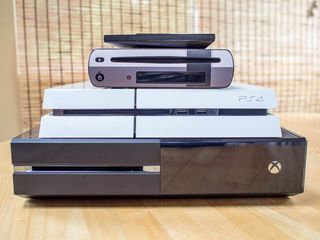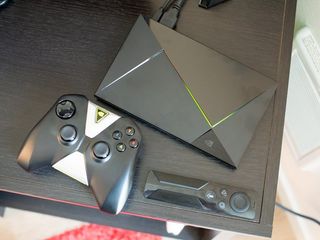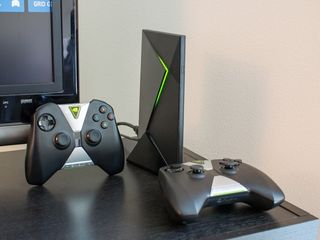GeForce Now elevates the NVIDIA Shield Android TV to console status

I'm just about as platform agnostic as they come when video games are involved. I'll happily waste a Saturday building levels in Super Mario Maker on the Wii-U with my kids, swap out my camera and pile of phones for my HOTAS setup for some Elite: Dangerous on my PC when the work day is over, get sucked in to another Bungie epic with Destiny on my PS4, or address my strangely emotional response to Cortana's mental state in Halo on my Xbox One. I'll play mobile games on my phone, second screen games on my tablet, and I've even been known to carry around a PS Vita or Nintendo 3DS on the off chance there's a free minute when travelling.
Recently, NVIDIA invited me to participate in some early testing of their GeForce Now service, previously known as GRID Gaming Beta. It's not for everyone, and there's still some bugs to sort out, but after a couple of days with the final version of this service I think NVIDIA has all the right parts for a truly next-gen console.

Before we get too ahead of ourselves, let me take you back to the dawn of the video game console. An age where PCs were terribly expensive, but gaming was clearly a market worth investing in. Consoles arrived to offer an inexpensive computer specifically for gaming, a content machine where all you did was play the games you were offered by the manufacturer. You bought your game, put the game in your console, and when you powered on the machine your game was immediately ready to play. No complicated install instructions, load times, or having to deal with catastrophic failure when something else went wrong with your PC. Simple, inexpensive, and thoroughly enjoyable.
Games launch in under 30 seconds, with no downloads needed and no installation required.
Fast forward to today. I purchased a copy of Destiny: The Taken King, which came with a disc and a download code. I put the disc in, and after the game was done installing to my PS4 I had to download an extra 15.4GB of game from a server whose ability to provide me with the file could loosely be described as almost functional at the time. It took nearly five hours to go from purchase to gameplay. The original promise of the console has been replaced with most of the original downfalls of playing on a PC, the irony of which being how much more convenient and relatively inexpensive PC gaming has become if you don't want the absolute best graphics. In a world where I can get a Core i3 with 6GB of RAM and a 1TB hard drive in a laptop form factor for the same cost as an Xbox One, the only thing "consoles" have going for them right now is a game library and a TV friendly UI.
Enter the NVIDIA Shield Android TV with GeForce Now. A $199 set top box with access to over 100 Google Play games (some of which now are playable in 4K), over a dozen truly great Shield exclusives, and a $6.99/month game streaming service that grants the user access to what essentially amounts to Amazon Instant Video for gaming. I can fire up Blaz Blue: Calamity Trigger and have it start in seconds, in 1080p at 60fps no less. I can do the same for a handful of AAA titles, like the basically brand new Witcher 3 game, and have it launch just as quickly with the same kind of quality playback. Games launch in under 30 seconds, with no downloads needed and no installation required.

These aren't just stats from NVIDIA, either. I lost a Saturday to The Witcher and couldn't tell the difference between playing it on this set top box and playing it on my sub $800 PC. While my desktop is due for an upgrade, the quality here is impressive. NVIDIA doesn't have a ton of games in GeForce Now able to demonstrate PC quality graphical prowess, but everything they do have gets the smooth part down with no problem. There's a healthy selection of multiplayer games, and as long as the title supports it I can even plug in a mouse and keyboard and enjoy things that way, which is great because the Shield Controller isn't great for everything.
It's clear there's room in the market for this kind of experience.
There's a few obvious caveats, and some things that aren't quite finished. You have to be connected to a very nice internet connection. NVIDIA says it can do 1080p at 30fps with a 25mb connection, and that it needs roughly double that for 60fps. My 150/150 FIOS connection didn't give it any problems, but not everyone has a great internet connection. During gameplay I did notice the occasional hiccup, but they were few and far between and the system recovered almost instantly. You'll also occasionally run into key translation issues, like when you're asked to press the generic Android menu button on your Shield Controller and that icon doesn't actually exist on the Shield TV version of that hardware. You also can't pause a game somewhere and leave for a while, as GeForce Now will disconnect after you've been idle for a while and you'll lose anything that wasn't saved. These are all entirely fixable things, though, and NVIDIA has demonstrated they are listening closely to their audience right now.
Be an expert in 5 minutes
Get the latest news from Android Central, your trusted companion in the world of Android
I'm not suggesting someone sell their Xbox One and pick up a Shield TV, or that you should give up on that epic PC build in exchange for a simpler setup out of convenience, but it's clear there's room in the market for this kind of experience. It's even more clear there are people out there who would enjoy this exact setup. No maintenance, low cost, and the option to purchase games and play the on both the Shield TV and your actual PC, not to mention the ability to stream games from your PC if you've got an NVIDIA card that plays nice with that setup.

What NVIDIA has here are the building blocks for something great. The resurrection of the game console as an instant enjoyment machine. The simpler yet fully enjoyable gaming machine for folks who aren't willing or able to get behind the $1,500+ VR gaming rigs Oculus and Valve are going to start pushing in a few months, without all the hurdles of what we now call consoles and less than 1/4 the size. It's an impressive opportunity this company has created for itself, and there's a reasonable chance we'll all get to watch this grow together.

